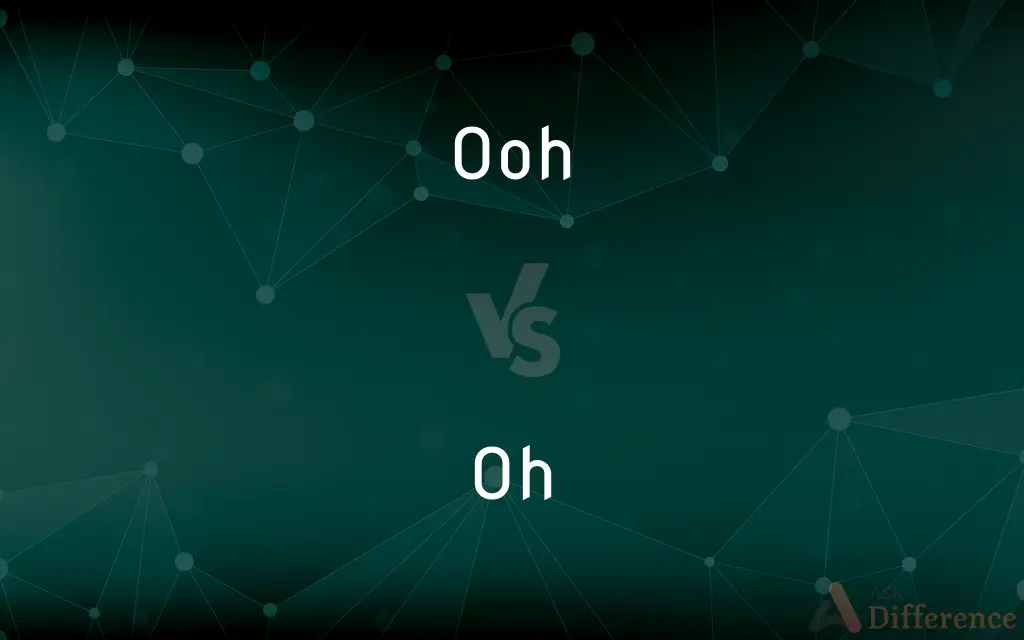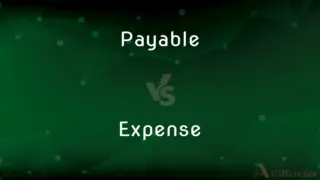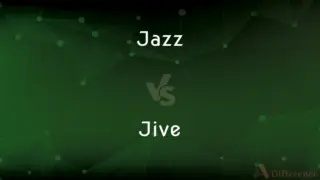Ooh vs. Oh — What's the Difference?
By Urooj Arif & Fiza Rafique — Updated on March 28, 2024
"Ooh" expresses surprise, admiration, or excitement, while "Oh" is a versatile exclamation used for realization, acknowledgment, or emotion.

Difference Between Ooh and Oh
Table of Contents
ADVERTISEMENT
Key Differences
"Ooh" is often used to express a sudden reaction to something surprising, pleasing, or impressive. It's a vocalization of one's excitement, admiration, or sometimes even desire. "Oh," on the other hand, serves a broader range of expressions, including surprise, realization, disappointment, or acknowledgment, and can introduce statements or questions.
While "ooh" might be used when someone is impressed by a stunning view or an attractive item, "oh" could precede a realization or correction of a previous statement. For instance, "ooh" might be heard at fireworks displays, whereas "oh" could start a sentence where someone corrects themselves or acknowledges something they had forgotten.
"Ooh" can also intensify the emotion behind the reaction, making it more about the sensory or emotional impact of the experience. "Oh," however, often carries a tone of reflection, realization, or transition, shifting the conversation or thought process to a new point or acknowledging an external stimulus.
The use of "ooh" is generally more associated with positive emotions and is less formal, typically found in casual speech or exclamations of delight. "Oh" is more neutral and can be used in a wide array of contexts, from casual to formal, depending on the tone and accompanying words.
Despite their differences, both "ooh" and "oh" serve as important linguistic tools for expressing a range of emotions and reactions. They highlight the nuances of human expression and how slight variations in sound can convey different meanings or intensities of feeling.
ADVERTISEMENT
Comparison Chart
Expression
Surprise, admiration, excitement
Realization, acknowledgment, emotion
Context
Positive, delightful situations
Broad, including surprise, disappointment, acknowledgment
Tone
Generally positive or excited
Can range from neutral to emotional, depending on context
Usage
More informal and expressive
Versatile, used in both casual and formal contexts
Emotional Impact
High, often related to sensory or emotional reactions
Varied, often reflective or transitional
Compare with Definitions
Ooh
Indicates admiration.
Ooh, look at that sunset!
Oh
Expresses surprise or shock.
Oh, how did that happen?
Ooh
Reflects a positive reaction.
Ooh, that’s impressive!
Oh
Introduces statements or questions.
Oh, are we going now?
Ooh
Expresses delight or surprise.
Ooh, that's a beautiful dress!
Oh
Signals realization or understanding.
Oh, now I see what you mean.
Ooh
Conveys excitement.
Ooh, I can't wait to open my presents!
Oh
Acknowledges information.
Oh, I’ll remember that for next time.
Ooh
Used in response to sensory experiences.
Ooh, this cake tastes amazing!
Oh
Used for a wide range of emotions.
Oh, I didn’t know you were here.
Ooh
Used to express pleasure, satisfaction, surprise, or great joy.
Oh
Used to express strong emotion, such as surprise, fear, anger, or pain
Oh—can't you stop making so much noise?.
Ooh
To exclaim in pleasure, satisfaction, surprise, or great joy
Everyone oohed and aahed as the gifts were unwrapped.
Oh
Used in direct address
Oh, sir! You forgot your keys.
Ooh
An expression of surprise.
Oh
Used to indicate understanding or acknowledgment of a statement
Oh, I see. You can't come until tomorrow.
Ooh
An expression of awe.
Oh
Zero.
Ooh
A sound made to imitate a ghost.
Oh
Expression of surprise.
Oh! I didn't see you there.
Ooh
An expression of affection.
Oh
Expression of wonder, amazement, or awe.
Oh, wow! That's amazing.
Ooh
An expression of pain.
Oh
Expression of understanding, affirmation, recognition, or realization.
Oh, so that's how it works.
Ooh
An expression of interest or anticipation.
Ooh, that looks delicious!
Oh
A word to precede an offhand or annoyed remark.
Oh, leave me alone.
Ooh
An expression of excitement or enthusiastic interest.
Ooh, I love that book!
Oh
A word to precede an added comment or afterthought.
Oh, and don't forget your coat.
Ooh
An exclamation of ooh.
Oh
An invocation or address (similar to the vocative in languages with noun declension), often with a term of endearment.
Oh, gosh
Ooh
To exclaim ooh.
Oh
Exclamation for drama or emphasis (often poetic).
Oh, when will it end?
Oh
Expression of pain. See ouch.
Oh! That hurt.
Oh
Space filler or extra syllable, especially in (popular) music.
Oh
(interrogative) Expression of mild scepticism.
"You should watch where you're going!" "Oh?"
Oh
A word to mark a spoken phrase as imaginary.
What if he says "Oh, I need to see your ID"?
Oh
An utterance of oh; a spoken expression of surprise, acknowledgement, etc.
Oh
The letter O, o (more commonly spelled o)
Oh
The digit 0 (especially in representations of speech)
My telephone number is four-double-three-two-oh-nine.
Oh
(intransitive) To utter the interjection oh; to express surprise, etc.
Oh
An exclamation expressing various emotions, according to the tone and manner, especially surprise, pain, sorrow, anxiety, or a wish. See the Note under O.
Oh
A midwestern state in north central United States in the Great Lakes region
Common Curiosities
Can "ooh" be used in formal settings?
"Ooh" is generally more informal and is most often found in casual conversation or reactions.
In what situations is "oh" used?
"Oh" is used in a variety of situations, including acknowledgment, realization, disappointment, or to introduce statements or questions.
Are "ooh" and "oh" interchangeable?
They are not interchangeable due to their different connotations and uses. "Ooh" is for expressing positive reactions, while "oh" has broader, more varied uses.
What does "ooh" express?
"Ooh" expresses surprise, admiration, or excitement, often in response to something pleasing or impressive.
What is the difference between "ooh" and "oh" in terms of emotion?
"Ooh" typically indicates positive emotions like excitement or admiration, while "oh" can convey a broader range of emotions from surprise to disappointment.
How does context affect the use of "ooh" and "oh"?
The context can significantly affect the use; "ooh" is used in positive, exciting contexts, whereas "oh" is versatile and used across a wide range of emotional and conversational contexts.
How are "ooh" and "oh" used in storytelling or literature?
In storytelling or literature, "ooh" is used to convey characters' excitement or admiration, and "oh" is used more broadly for reactions, acknowledgments, or transitions in dialogue.
Can "oh" precede questions?
Yes, "oh" can introduce questions, often signaling a change in the direction of conversation or a realization.
Is "ooh" used in writing?
"Ooh" is used in writing, especially in dialogue or narrative to convey characters' reactions, though it is more commonly used in speech.
Is there a difference in formality between "ooh" and "oh"?
Yes, "ooh" is generally less formal and used more in expressive, casual contexts, while "oh" is neutral and versatile across formal and informal settings.
How does the tone of voice affect "ooh" and "oh"?
The tone of voice can greatly impact the meaning, with "ooh" generally conveyed excitedly and "oh" varying from neutral to surprised, depending on the context.
What emotions can "oh" express?
"Oh" can express a range of emotions including surprise, realization, disappointment, and acknowledgment, depending on the context and intonation.
What does a prolonged "ooh" imply compared to a short one?
A prolonged "ooh" might imply a stronger reaction or deeper admiration, while a short "ooh" could indicate a quick, positive surprise.
How do cultural differences affect the use of "ooh" and "oh"?
Cultural differences can affect the perception and use of these expressions, though they are widely understood in contexts where English is spoken or consumed through media.
Can "oh" express disappointment?
Yes, "oh" can express disappointment, often conveyed through tone and context.
Share Your Discovery

Previous Comparison
Payable vs. Expense
Next Comparison
Jazz vs. JiveAuthor Spotlight
Written by
Urooj ArifUrooj is a skilled content writer at Ask Difference, known for her exceptional ability to simplify complex topics into engaging and informative content. With a passion for research and a flair for clear, concise writing, she consistently delivers articles that resonate with our diverse audience.
Co-written by
Fiza RafiqueFiza Rafique is a skilled content writer at AskDifference.com, where she meticulously refines and enhances written pieces. Drawing from her vast editorial expertise, Fiza ensures clarity, accuracy, and precision in every article. Passionate about language, she continually seeks to elevate the quality of content for readers worldwide.














































